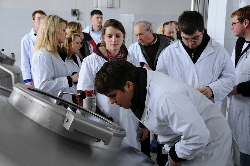University News
For Ag Major, Russian Study Abroad Program Provides Perspective
April 24, 2012
MACOMB, IL – For Jeremy Wolf, a junior majoring in agriculture business at Western Illinois University, a recent Russian agriculture study abroad program gave him a different perspective about the subject of history. Last month, the president of Western's Alpha Gamma Rho fraternity from Dixon (IL), along with School of Agriculture Professor John Carlson, Associate Professor Kevin Bacon and 17 WIU students, traveled in Russia during Western's 2012 Spring Semester Break.
Wolf said there were many aspects of the trip he enjoyed, activities that engaged him and his fellow students in a number of horizon-broadening experiences. Among them were tours of Russian farm operations and several historical sites, as well as a couple of visits to universities in the region they traveled, which was mainly around Moscow and Ryazan, situated approximately 126 miles southeast of Moscow.
"We visited a university in Moscow, and then one in Ryazan. That was probably the most enjoyable time and fun I had on the trip. Getting to meet the other students, and now keeping in contact them through Facebook and email… That is a great benefit of the program," Wolf noted. "And although I have never really liked to study history, I found that learning about the history of this country was absolutely amazing to me. In addition to visiting farms and universities, we visited quite a few cathedrals and churches. The artwork there is just magnificent, and everything we saw -- the structures, the artwork -- had a story behind it. I learned about how many structures have been restored or are being restored because, during World War II, they were destroyed. It was amazing to see how they have bounced back from that. I guess that was another interesting part that I got from it that I didn't really expect to," Wolf explained.
The tours of the farm operations, Wolf said, were particularly enlightening, especially when it came to being able to compare his personal experience of farm operations in the U.S. with those he saw in Russia. He said the group toured a couple of dairy operations, one that is approximately 3,000 acres and another he described as an "enormous" operation of 35,000 acres.
"In Russia, I saw first hand how much more the U.S. is technologically advanced. It was kind of like a blast back in time, especially when you saw the kind of equipment they use. The large operation we visited, the one with 35,000 acres, had a fleet of 25 combines, and only one out of those 25 combines is equipped with GPS [global positioning system] auto-steer capabilities. That was just astounding to me," Wolf said. "From the farm managers directly, we learned how their lack of available capital keeps them from investing into areas like technologically advanced equipment," he added.
Wolf noted, to him, it seemed as if the Russian farm managers had the same basic goal of profitability, but he said he thought, due to their circumstances, they had to work differently -- than a manager of a typical U.S. farm operation would -- toward achieving it.
Carlson -- who has helmed several of the Russian agriculture faculty-led study abroad programs through WIU's Office of Study Abroad -- noted the Russian trip provides the students a valuable experience, enabling them to examine aspects of the Russian agriculture industry and exposing them to the idea of foreign markets up close.
"In the Russian agriculture study abroad program, the students are introduced to some of the realities of the Russian agriculture industry, for instance, that the country is not self-sufficient in producing food for its citizens. Russia imports a fair amount of food, and for the U.S. farmer, there are a lot of opportunities as far as a market for products," explained Carlson, who will be teaching at Ryazan University in Russia on a Fulbright Scholar grant this fall. "Another side of the opportunity in the Russian market is that, overall, individuals' incomes are rising, so they may have more available income to spend on imported products or Russian products that have been enhanced through the use of some of the U.S.'s technologically advanced agriculture products and practices."
Carlson noted the learning goal of the study abroad program is facilitated through the students' exposure to a different culture and, many times, a different way of practicing in the agriculture industry.
"Virtually every agricultural company is international, many of our students will likely eventually be working with people in other countries as business partners, customers or suppliers," he said.
For more information about the 2012 Russian Agriculture Study Abroad Program, contact Carlson at (309) 298-1611 or JP-Carlson@wiu.edu. For more information about Western's study abroad programs, contact the Office of Study Abroad at (309) 298-2504 or visit www.wiu.edu/studyabroad.
Posted By: Teresa Koltzenburg (WIUNews@wiu.edu)
Office of University Communications & Marketing



Connect with us: